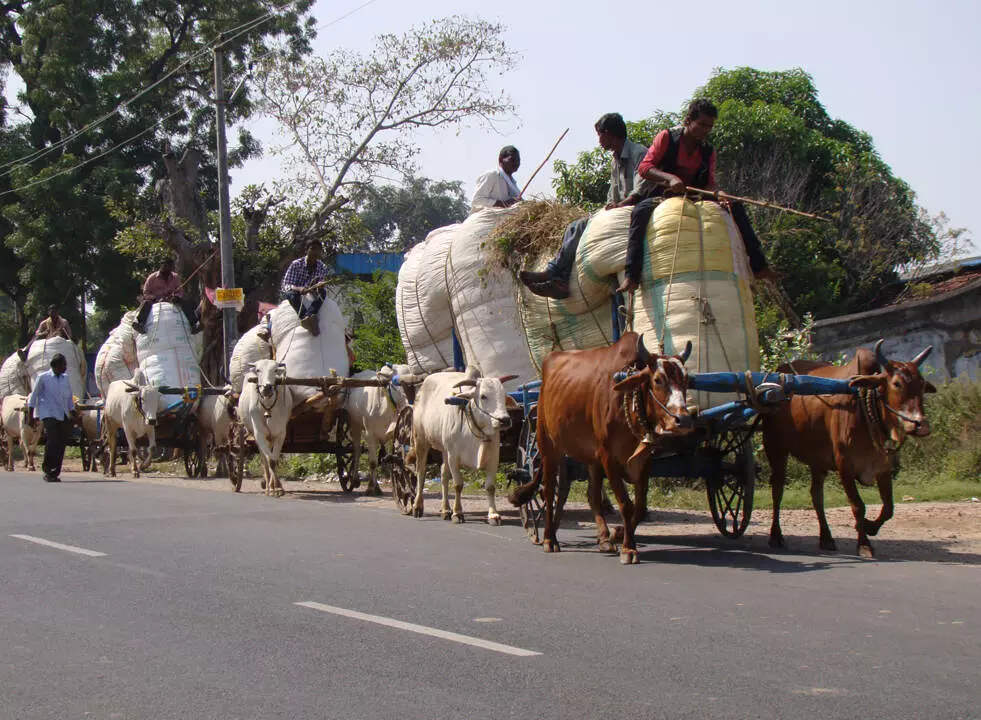Why are IT raiding Cotton Industry in Telangana; Is it used to bribe voters?
A study of the issue reveals that there is scope for large-scale 'camouflaged' cash transactions via the cotton trade which can be used as bribes.
By S. Harpal Singh
Adilabad: The cotton trading season has started but the rather customary protests by farmers demanding remunerative prices for their produce are conspicuously absent.
The 'white gold' trade and processing industry, however, is in the news for all the wrong reasons.
Income Tax raids on cotton traders and businessmen in parts of North Telangana have highlighted the industry's alleged connection with unscrupulous politicians in pumping in huge amounts of cash for bribing farmers/voters in different constituencies.
A study of the issue reveals that there is scope for large-scale 'camouflaged' cash transactions via the cotton trade which can be used as bribes.
The fact that a large number of farmers are at one end of the chain of payments for their produce makes the task relatively easy for politicians to supply cash aimed at bribing voters via a colluding trader. Also, the provision under Rule 6DD of the IT Act facilitates making payments to farmers for their agricultural produce in cash.
How the Income Tax department is raiding big cotton businesses indicates that the agency also understands the nuances involved in unfair elections thanks to the 'unholy' alliance between industry and politics. Observers opine that the raids on big businesses will have a salutary effect on the flow of illegal cash in elections which is what is stated to be the purpose of the whole exercise by the enforcement agencies.
The traders and businessmen raided in Kumram Bheem Asifabad, Mancherial, Peddapalli, and Jangaon etc a couple of days back are known for their association with one or the other frontline political outfits. Some of them are known to have withdrawn huge amounts of money from banks recently purportedly for payment to farmers for their produce.
A cotton ginner in Asifabad reportedly withdrew cash over Rs. 5 crore right in the middle of elections. He will have a lot of explanation to do in the coming days, according to sources.
The role that cotton traders can play in the circulation of illegal money during elections first came to light in the Adilabad Assembly constituency during the 2018 elections which were also held in the thick of the cotton trading season. There were rumors that farmers/voters were being bribed for favoring given candidates by way of inflated payments.
As Adilabad and adjoining Boath (ST) constituency are cotton-rich areas, almost 80 percent of the voters form part of the cotton trading chain. They are in touch with cotton traders, albeit indirectly through the cotton commission agents for receiving payment for their produce.
The trader, usually a businessman owning a cotton processing industry, purchases raw cotton through the cotton commission agents and makes payments, also through the latter. Under a 'relaxed' situation, It is quite easy to hand over cash to farmers but the 'theft' can be caught easily if cross-checking of payments by traders is done which is presumably being done as part of the raids.
To put things in perspective, Adilabad has about 25 operational processing industries, each one logging over Rs. 100 crore worth of turnover during the 6 month season."It is quite easy for a cotton businessman or trader to 'absorb' Rs. 10 crores or Rs. 20 crore received from sources like politicians," an insider pointed out.
According to a source in a major political party, funding in this manner had started in the week preceding the announcement of the schedule of the elections. "Candidates are giving the money to select elders in given villages for local distribution," the source revealed hinting that much of the 'work' has already been done.
Whatever is left of it is being done through the delivery of cash to caste elders. In the leftover villages representatives of 'big' contestants are organizing meetings with caste elders and even making a promise to fulfill their demands after the elections.